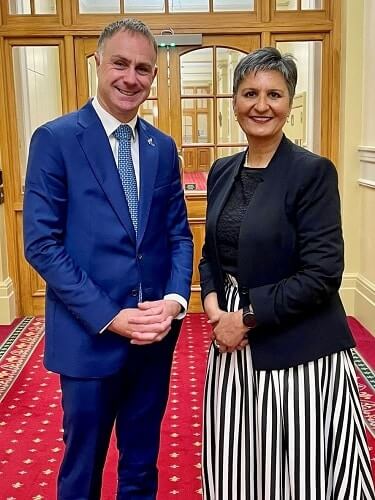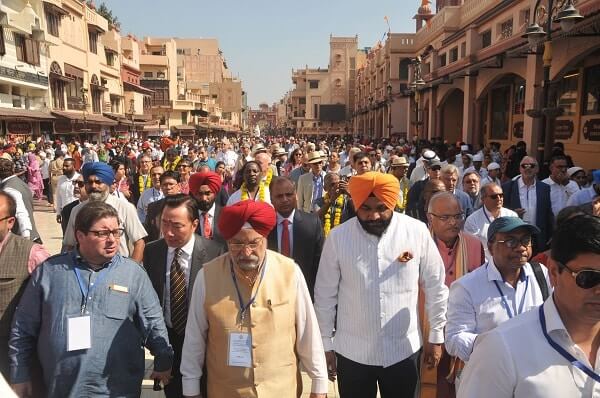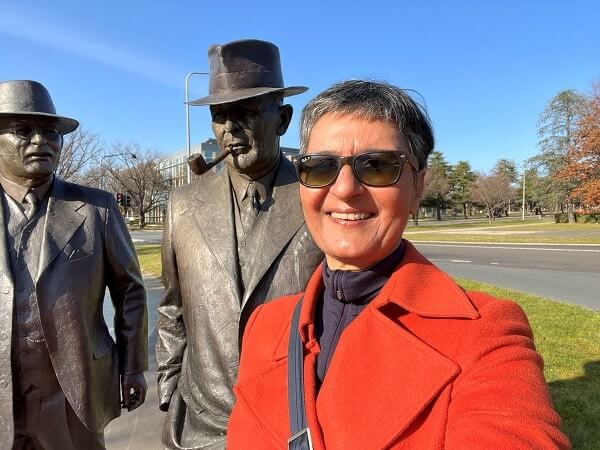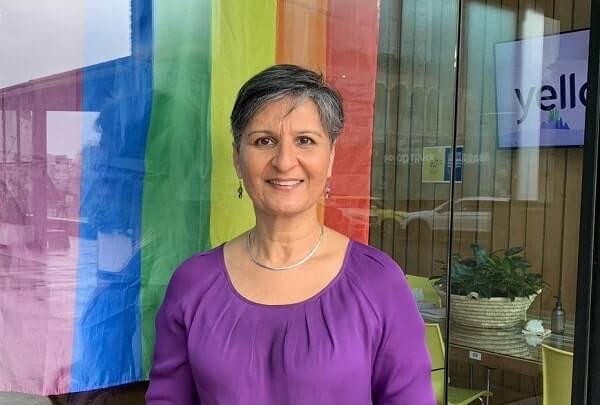We know of Harinder Sidhu as the former Australian High Commissioner to India, having served there from 2016-2020. She is currently the Australian High Commissioner to New Zealand, and has also served in Cairo, Damascus and Moscow. In this year’s Australia Day Honours, Ms Sidhu has been appointed a Member of the Order of Australia (AM) for significant service to public administration and to foreign affairs.
Excerpts below from a conversation between Ms Sidhu and Pawan Luthra
Pawan Luthra (PL): Welcome to Indian Link, Your Excellency, and congratulations on your recognition today. How do you feel about this latest honour?
Harinder Sidhu AM (HS): I often hear people say they feel humbled, and now I know what that really means. That is my first overwhelming feeling. I’m humbled in two ways: one is that I really look around me and recognise that I’m surrounded by so many people who are worthy of recognition… the great privilege and honour of this recognition is not lost on me.
The second thing is also to recognise that for what I’m being honoured for, I never really did alone. You do it by standing on the shoulders of giants, with the support of people around you. It’s genuinely a team effort, who you become, and my family, and my mother and father have been my most foundational support.
PL: Let’s go back to when you entered the highly competitive graduate program with the Department of Foreign Affairs (DFAT) in 1987 – less than 1% of applicants were admitted. You arrived in this country as a 10-year-old, with no elite connections, and yet you have risen to the top of your profession. What has been your family’s reaction?
HS: Well, they are very, very proud. When I joined the Foreign Service, it really confirmed in my father’s mind that Australia is a meritocracy, that you don’t have to have privilege or connections to join the Foreign Service, you just have to work hard.
That’s always been his ethos. I think both my mother and father are very delighted. But my father always believed I could achieve anything, so he’s not surprised. They constantly tell me how proud they are of me, and that means a lot.

PL: That’s fantastic. Your Excellency, Foreign Minister Penny Wong said recently, “We can go to most parts of the world and say, we are you. We look like you.” How did being an Australian-Indian play into your posting as India’s High Commissioner from 2016 to 2020?
HS: The ability to look at the world through the eyes of Indians, and to understand how India comes into the world, is really the job of a diplomat. I realised through my upbringing and my cultural background, it was easier to make those connections and to understand how India looked at the world, and to explain that back to Australia, because of course, I speak both languages in that sense. It’s been a tremendous asset, and we have, as a foreign affairs department, actively tried to use this asset. I think my great effectiveness in India was, in large part, due to my ability to make that connection.
Most people in Australia who’ve grown up in migrant communities have learned the art of cultural interpretation, and that is so much of what we do here as well. Our job as diplomats is to take Australia to the world, and that’s not just what we stand for, but it’s also who we are.
PL: Your posting as High Commissioner to India came when the relationship between the countries was just starting to warm up. What do you consider the professional and personal highlights of your tenure in India?
HS: I think my professional highlight was building layer upon layer of the India-Australia relationship; I was working very closely with folks in Canberra and Delhi to really elevate the relationship to what I call a first-tier relationship. That was something that we articulated in the Australian Foreign Policy White Paper in 2017, and it culminated in the Comprehensive Strategic Partnership, which we agreed on soon after my departure in 2020. It was really a shift in the stature of the relationship – along the way India joined the Quad, as did Australia; we deepened our strategic relationship. All those underpinnings led to the conclusion of an early harvest Free Trade Agreement after my departure. The shift in our relationship with India is something I feel very satisfied by and honoured to be a part of. Harinder Sidhu AM

My personal highlight was taking my father to his birth village in Punjab. We were greeted with all the fanfare that you expect from Punjabis – it was so meaningful for my father because he was getting older, and he knew he wouldn’t have another chance to go back. There was this wonderful moment where this old man came up to my father, and the two men hugged each other, saying things like, you haven’t changed a bit. It turned out that this fellow was my dad’s childhood school friend. It was very touching.
PL: I can well imagine. Ms Sidhu, over 37 years, you’ve been there when Russia opened under the Glasnost reforms, when 9/11 took place, when the Middle East changed after Saddam Hussein. You saw the rise and rise of China, and the growth of young India. Right at this moment, we’re seeing the Israel-Palestine issue on our headlines. We’re grappling with violent conflicts, security threats, and energy shocks. The world is just less benign. What do you see as challenges for today’s diplomats, and Australian diplomats in particular?
HS: I think the challenge is how we manage competing challenges, you know, the competing forces in the world at the moment; diplomats need to constantly keep an eye on their national interest as they weave their way through all these challenges.
These challenges are becoming more diverse and more amorphous. We are seeing much more exercise of influence and much more soft power instead of hard power. We’re having to learn new methods and new ways of conducting diplomacy. There’s a lot more public facing work that diplomats have to do to bring our publics along with us, and we need to deal with a wider cross section of the community rather than just government to government relations.
There’s been a big learning curve, the pace at which things are happening is very quick. Decisions have to be made quickly and the risks of getting things wrong can be quite high. It’s perhaps more challenging to be a diplomat now than over the period I’ve seen; the challenges are coming thick and fast.

PL: For new migrants, what would be your advice about settling down and succeeding in a new country?
HS: I talked about being able to speak in both cultures. But it’s also about understanding you’re Australian first, and you can never lose sight of that. Your cultural background is valuable, but you do need to always put Australia first in your role. Understanding how Australia thinks, what we care about and what our values are in the world is very important to learn and to project because that’s what we do every single day.
PL: If you hadn’t become a diplomat, where do you think your skill set would have taken you? Harinder Sidhu AM
HS: I would say a history teacher. I trained in law, but I have a real fascination for history. The thing about being a diplomat is that you’re at the coalface of history. I have had the enormous privilege of witnessing history unfold in front of me. So, in some ways, I’m indulging my passion for history and politics, which has been a source of constant fascination for me.
PL: If you had to write a book, what would it be, Your Excellency?
HS: (Laughing) It’d be [something like] ‘a view on the world’, you know, about how your personal experiences always colour how you see things. The interesting thing about historical accounts is that everybody will see things a little bit differently from their own perspective.
PL: And finally, Your Excellency Harinder Sidhu AM, at the recent World Cup cricket final between Australia and India, did you have celebratory lamingtons in the fridge, or was it gajar ka halwa?
HS: Lamingtons for sure!
READ ALSO: Professor Kuntala Lahiri-Dutt, AO: Australia Day Honours 2024




